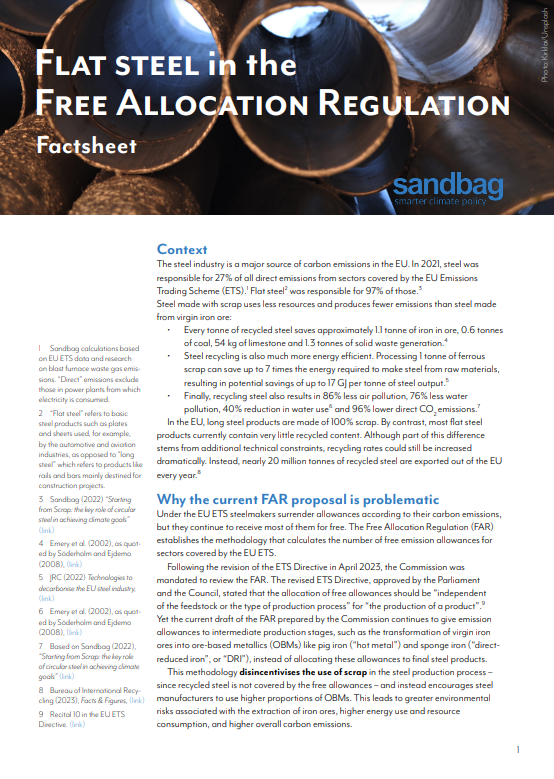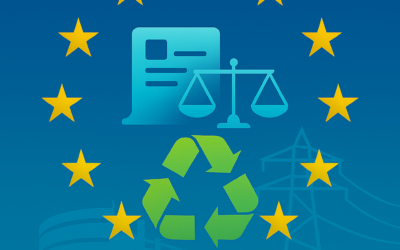Flat Steel in the Free Allocation Regulation
Following the revision of the EU Emissions Trading System (ETS) Directive in April 2023, the European Commission was mandated to review the Free Allocation Regulation, which establishes the methodology that calculates the number of free emission allowances for sectors covered by the EU ETS.
The revised ETS Directive, approved by the European Parliament and the European Council, stated that the allocation of free emission allowances should be “independent of the feedstock or the type of production process” (Recital 10, ETS Directive). However, our sources show that the Commission plans to continue allocating free emission allowances to intermediate steel production stages, such as the transformation of virgin iron ores into ore-based metallics (OBMs) – like pig iron (“hot metal”) and sponge iron (“direct-reduced iron”, or “DRI”).
This not only goes against the agreed political direction set by the Parliament and the Council, it also contradicts with EU climate and circularity goals. By encouraging steel manufacturers to use higher proportions of OBMs, the Commission’s proposal disincentivises the use of scrap in steel manufacturing. This will lead to greater environmental risks associated with the extraction of iron ores, higher energy use and resource consumption, and higher overall carbon emissions.
Sandbag produced a factsheet that explains why tackling emissions from the European steel sector is so important and why ferrous scrap has a role to play to decarbonise the steel industry. It debunks certain facts about the use of scrap in steelmaking and provides scenarios to demonstrate why the Commission’s draft (expected in October 2023) for the revision of the Free Allocation Regulation would be problematic.
Our factsheet also includes a potential solution to this problem. We propose to modify the benchmark for hot metal and direct-reduced iron envisioned by the Commission, so that, in the case of integrated steel plants (plants that produce both OBMs and crude steel), free allocation becomes proportional to their flat steel output instead of hot metal/DRI. This requires minimal change to the Free Allocation Regulation, would not (on average) affect the number of free allowances received by these plants, and would help establish a level-playing field between scrap and OBMs.
Photo by Kirklai – Unplash
Read More:
Steel labelling: Beyond the sliding scale
As EU policymakers debate how to certify low-carbon steel, Sandbag’s new briefing analyses the “sliding scale” method — and outlines why it may hinder rather than help decarbonisation. A new model is proposed based on product-specific benchmarks, multi-tier ratings, and circularity incentives.
Scrap Steel at Sea: How ship recycling can help decarbonise European steel production
As Europe seeks to decarbonise its steel industry, a new Sandbag report highlights an overlooked solution: high-quality scrap steel from retired ships. With up to 15 million tonnes of certified scrap available annually, ship recycling could meet 20% of EU steel scrap demand — if policy gaps are addressed.
Sandbag’s feedback to the call for evidence on the Circular Economy Act
Sandbag welcomes the Circular Economy Act (CEA) as an important step to accelerate the transition to a circular economy in the EU. Progress in this area has been slow and this act is sorely needed to address systemic issues holding back circularity, including the current fragmented approaches across Member States.




